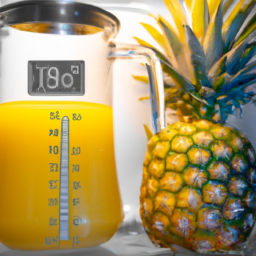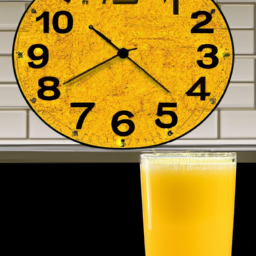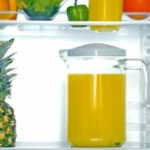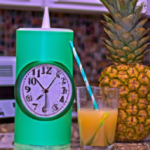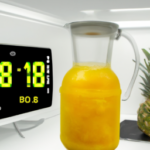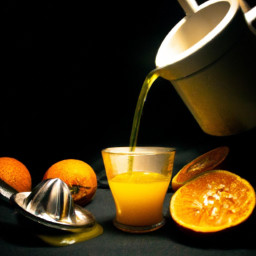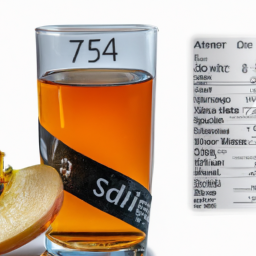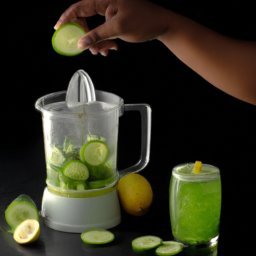Being someone who enjoys sipping on pineapple juice from time to time, I often wonder how long it stays fresh and drinkable. Should it be consumed immediately or can it last in the refrigerator for a few days? After doing some research, I am excited to share what I have discovered about the shelf life of pineapple juice in the fridge and the factors that can impact its freshness.
Pineapple juice is a popular beverage that is enjoyed for its sweet and tangy flavor, as well as its numerous health benefits. However, like all perishable products, pineapple juice can spoil over time. Understanding its shelf life is important to avoid consuming expired juice, which can lead to foodborne illness.
In this article, I will provide an overview of the shelf life of pineapple juice, signs of spoiled juice, tips for extending its shelf life, and common myths associated with this tropical drink.
Key Takeaways
- The shelf life of pineapple juice depends on the type and storage.
- Fresh pineapple juice can last 3-5 days in the fridge, while store-bought juice can last up to 2 weeks if stored correctly.
- Once opened, pineapple juice lasts 5-7 days in the fridge, and signs of spoilage include sour smell/taste, cloudiness, and mold growth.
- To extend the shelf life of pineapple juice, it should be kept refrigerated at all times, transferred to an airtight container, and frozen if needed.
Understanding the Shelf Life of Pineapple Juice
You might be wondering how long your pineapple juice will last in the fridge, but don’t worry, it’s important to understand the shelf life to ensure you’re getting the most out of your juice.
Pineapple juice is a perishable product that can spoil over time. The shelf life of pineapple juice varies depending on the type of juice and how it’s stored.
To maximize the shelf life of your pineapple juice, it’s important to store it properly. Pineapple juice should be kept in the refrigerator at all times, even before it’s opened.
Once opened, pineapple juice can last for 5-7 days in the fridge. To check if your pineapple juice is still fresh, look for signs of spoilage such as a sour or off smell, or a change in color or texture.
By following these storage tips and freshness indicators, you can ensure that your pineapple juice stays fresh and delicious for as long as possible.
How Long Can Pineapple Juice Last in the Fridge?
I’ve often wondered about the shelf life of pineapple juice, especially when it comes to freshly squeezed versus store-bought.
To be more precise, how long can I keep fresh pineapple juice in the fridge before it goes bad?
And what about store-bought pineapple juice, does it have a longer shelf life?
These are important questions to answer if you want to avoid wasting juice or risking your health.
Shelf Life of Fresh Pineapple Juice
Fresh pineapple juice has a shelf life of about 3-5 days in the refrigerator. To preserve its freshness, it’s important to store it properly. Once you’ve opened a container of fresh pineapple juice, make sure to keep it tightly sealed in the fridge.
If you’ve made the juice yourself, use an airtight container or cover it with plastic wrap before refrigerating it. This will prevent air and bacteria from getting in and spoiling the juice.
It’s important to note that the shelf life of fresh pineapple juice may vary depending on its quality and the storage conditions. If the juice is exposed to heat or light, it may spoil faster. Also, if it has a sour smell or taste, it’s best to discard it.
Now, let’s move on to the shelf life of store-bought pineapple juice.
Shelf Life of Store-Bought Pineapple Juice
When buying pineapple juice from the store, consumers can tell if it’s still safe to drink by checking the expiry date of the juice before purchasing it. The shelf life of store-bought pineapple juice depends on various factors such as the processing method, packaging, and storage. Generally, pineapple juice can last for up to two weeks in the refrigerator if stored correctly. However, once opened, its shelf life decreases significantly, and it should be consumed within a few days.
To ensure that store-bought pineapple juice lasts as long as possible, it’s essential to store it correctly. Here are two sub-lists to evoke emotion in the audience:
-
Dos:
-
Always store pineapple juice in a cool and dry place.
-
Keep the juice away from direct sunlight and heat sources.
-
Use a clean glass or container to pour the juice.
-
Seal the container tightly after each use.
-
Store the juice in the refrigerator immediately after opening.
-
Don’ts:
-
Do not store pineapple juice outside the refrigerator for extended periods.
-
Do not leave the container open for too long.
-
Do not use a dirty glass or container to pour the juice.
Proper pineapple juice storage is essential to increase its lifespan in the refrigerator. However, if the juice has been stored incorrectly or for too long, it may spoil, and consumers should be aware of the signs of spoiled pineapple juice.
Signs of Spoiled Pineapple Juice
If pineapple juice has a sour smell or taste, it may be a sign that it has spoiled. Identifying spoilage in pineapple juice is important to avoid consuming it and risking food poisoning.
In addition to a sour smell or taste, spoiled pineapple juice may also appear cloudy or have mold growth. It is important to check the expiration date of the juice and consume it before it goes bad to avoid any health risks.
Proper storage is also key to extending the shelf life of pineapple juice. Keep the juice refrigerated at all times and make sure the container is tightly sealed. Avoid leaving the juice out at room temperature for too long and never drink it if it’s been left out for more than two hours.
By following these guidelines, you can ensure that your pineapple juice stays fresh and safe to consume for as long as possible.
Tips for Extending the Shelf Life of Pineapple Juice
Now that we know the signs of spoiled pineapple juice, let’s talk about ways to extend its shelf life. Proper storage is key to keeping pineapple juice fresh.
First, make sure to keep the juice refrigerated at all times, and avoid leaving it at room temperature for too long. Pineapple juice can quickly spoil in warm conditions, so it’s important to keep it chilled.
Another way to preserve pineapple juice is to transfer it to an airtight container. This will prevent air and bacteria from getting into the juice, which can cause it to spoil faster. Make sure to label the container with the date you opened the juice, as this will help you keep track of how long it has been in the fridge.
With these simple storage tips, you can extend the shelf life of pineapple juice and enjoy it for longer periods of time.
As we’ve discussed, proper storage is crucial to keeping pineapple juice fresh. But if you find that you have too much juice and fear it may go bad before you can drink it all, freezing is another option. In the next section, we’ll explore the process of freezing pineapple juice and how to thaw it properly.
Freezing Pineapple Juice
Want to enjoy pineapple juice all year round? Learn how to freeze it properly! Freezing pineapple juice is a great way to extend its shelf life and enjoy the delicious tropical taste whenever you want. Here are three benefits of freezing pineapple juice and some tips on how to defrost it properly.
-
Saves money: By freezing pineapple juice, you can buy in bulk and save money in the long run. You won’t have to worry about the juice going bad before you have a chance to drink it all.
-
Convenient: Freezing pineapple juice allows you to have a ready-to-drink beverage at any time. Whether you want a refreshing drink after a workout or a tasty addition to your smoothie, frozen pineapple juice is always available.
-
Retains nutrients: Freezing pineapple juice does not affect its nutritional value. You can still enjoy the same vitamins and minerals as fresh juice.
To defrost frozen pineapple juice, place it in the refrigerator overnight. Alternatively, you can place the frozen juice in a bowl of room temperature water and stir occasionally until it is fully defrosted.
Now that you know how to freeze and defrost your pineapple juice, let’s move on to using leftover pineapple juice in creative ways.
Using Leftover Pineapple Juice
I often find myself with leftover pineapple juice after making a recipe or mixing a cocktail. Luckily, there are many ways to use up this delicious juice.
Pineapple juice can be added to marinades for a tropical twist, used in baking to add moisture and flavor, or even used as a base for a refreshing smoothie.
Additionally, pineapple juice can be a great addition to cocktails, such as a classic piña colada or a refreshing pineapple margarita.
Pineapple Juice in Recipes
You can add a refreshing twist to your recipes by using pineapple juice, which can add a tropical flavor to your dishes. Here are three ways you can use pineapple juice in recipes:
-
Pineapple juice substitutions: You can replace other liquids in recipes, such as water or milk, with pineapple juice to add a unique flavor. For example, you can use pineapple juice instead of water when making rice or quinoa to give it a sweet and tangy taste.
-
Pineapple juice marinades: You can use pineapple juice as a base for marinades, which can tenderize meats and add a tropical flavor to them. Simply mix pineapple juice with some soy sauce, garlic, and ginger, and marinate your meat for a few hours before cooking it.
-
Pineapple juice in smoothies: Adding pineapple juice to your smoothies can give them a sweet and refreshing taste. You can combine pineapple juice with other tropical fruits, such as mango or papaya, to make a delicious and healthy smoothie.
Now, let’s move on to how you can use pineapple juice in cocktails.
Pineapple Juice in Cocktails
Using pineapple juice in cocktails adds a tropical twist and can transport you to a sunny beach. Pineapple juice cocktails are perfect for any occasion, whether you’re hosting a party or simply want to relax and unwind at home.
Pineapple juice can be mixed with a variety of other ingredients to create a unique and refreshing drink that’ll satisfy your thirst for something sweet and tangy. When it comes to choosing the best mixers for pineapple juice, there are many options to consider.
Some of the most popular mixers include coconut rum, vodka, and tequila. These spirits pair well with pineapple juice and can enhance the tropical flavor of the drink. Other mixers that work well with pineapple juice include orange juice, lime juice, and grenadine. These ingredients can add a citrusy or sweet flavor to the cocktail, depending on your preference.
Incorporating pineapple juice into your cocktail recipes is a fun way to create a refreshing and delicious drink. But, did you know that pineapple juice also has several health benefits?…
Health Benefits of Pineapple Juice
Although pineapple juice may not last very long in the fridge, it packs a punch of health benefits. Pineapple juice benefits can be attributed to its high nutritional value, including vitamins C, B1, and B6, as well as minerals like potassium and magnesium. Here are four ways pineapple juice can improve your health:
-
Digestive Aid: Pineapple juice contains bromelain, an enzyme that helps break down proteins in the digestive system. This can lead to a reduction in bloating and discomfort after meals.
-
Anti-inflammatory: Bromelain also has anti-inflammatory properties, which can help reduce inflammation and swelling in the body. This makes pineapple juice a great addition to your diet if you suffer from conditions such as arthritis or asthma.
-
Immune Booster: Pineapple juice is high in vitamin C, known to boost the immune system. Drinking pineapple juice regularly can help prevent illnesses and keep your body strong.
-
Skin Health: Pineapple juice contains antioxidants that can help fight free radicals and promote healthy skin. It also contains vitamin C, essential for collagen production, a protein that keeps skin firm and elastic.
As we move on to the next section about pineapple juice vs. other juices, it’s important to note that while pineapple juice may have unique health benefits, it’s important to incorporate a variety of juices into your diet to ensure you’re getting a diverse range of nutrients.
Pineapple Juice vs. Other Juices
Now that we know the numerous health benefits of pineapple juice, let’s compare it to other juices. Pineapple juice is an excellent source of vitamin C, manganese, and bromelain, which is an enzyme that aids in digestion. Unlike other juices that are high in sugar and calories, pineapple juice is a low-calorie, low-sugar option that can be a great addition to a balanced diet.
When it comes to juices for detox, pineapple juice is a popular choice due to its high antioxidant content, which can help flush out toxins from the body. It is also a natural diuretic, which can help reduce water retention and bloating. However, it is important to note that while pineapple juice has many benefits, it shouldn’t be relied upon solely for detoxification. A balanced diet and regular exercise are still the best ways to support overall health.
Moving on to the common myths about pineapple juice, many people believe that it can induce labor in pregnant women. However, there’s no scientific evidence to support this claim. In fact, consuming large quantities of pineapple juice during pregnancy may actually be harmful due to its high levels of bromelain, which can cause contractions. Let’s explore other myths and facts about pineapple juice in the next section.
Common Myths About Pineapple Juice
One misconception about pineapple juice is that it can induce labor in pregnant women. However, this claim has been debunked by medical professionals and researchers. While pineapple contains an enzyme called bromelain, which has been linked to softening the cervix, the amount present in pineapple juice is not enough to have any significant effect on labor induction.
Another common myth about pineapple juice is that it can cure illnesses such as the common cold and even cancer. While pineapple does contain vitamin C and other antioxidants that can support the immune system, there is no scientific evidence to suggest that it can cure or prevent any diseases.
It is important to seek medical advice and treatment from licensed healthcare professionals to address any health concerns.
Frequently Asked Questions
Can pineapple juice be stored in the freezer for longer periods?
Yes, pineapple juice can be stored in the freezer for longer periods. Freezing pineapple juice can extend its shelf life for up to 8 months. It’s important to use an airtight container to prevent freezer burn.
Is it safe to consume pineapple juice after its expiration date?
I investigated using expired juices and found that it can be risky due to bacterial growth. Pineapple juice safety depends on proper storage and expiration dates. Do not consume expired pineapple juice as it may cause foodborne illnesses.
What are the best ways to tell if pineapple juice has gone bad?
To determine if pineapple juice has gone bad, conduct a smell test and visual inspection. Look for changes in color, texture, and odor. Shelf life expectancy varies based on storage conditions and expiration date.
Can pineapple juice be mixed with other beverages or ingredients?
I enjoy experimenting with Pineapple juice mixology to create refreshing Pineapple juice cocktails. It can be mixed with other beverages or ingredients like coconut water, rum, and mint to add a tropical twist to your drink.
Are there any side effects associated with drinking too much pineapple juice?
Drinking too much pineapple juice can result in a pineapple juice overdose, causing potential dangers such as diarrhea and stomach pain. Mixing pineapple juice with alcohol can also have negative effects on the body.
Conclusion
So, there you have it. Pineapple juice is a delicious and healthy beverage that can last up to 7-10 days in the refrigerator, as long as it’s stored properly.
It’s important to look for signs of spoilage, such as an off smell or taste, and to follow some simple tips to extend its shelf life. Just like a fine wine, pineapple juice can benefit from being aged.
The longer it sits in the fridge, the more concentrated and flavorful it becomes. So, if you have a bottle of pineapple juice that’s been sitting in your fridge for a few days, don’t worry! It’s only getting better with time, like a fine cheese or a vintage car.
So pour yourself a glass and enjoy the sweet, tropical taste of pineapple juice, knowing that it’s not only delicious but also good for your health.
Ilana has been a vegan for over 10 years. She originally made the switch for health reasons, but soon found herself becoming more and more passionate about the ethical and environmental implications of a vegan lifestyle. Ilana is the author of The Graceful Kitchen, a blog all about veganism. She loves to cook up delicious and nutritious vegan meals, and share her recipes with others who are interested in leading a cruelty-free life. Ilana is also a strong advocate for using whole foods as the foundation of a healthy diet, and believes that going vegan is one of the best ways to achieve this.
